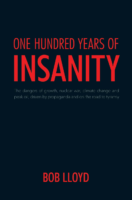 It is clear to many of us that we live in difficult times, with climate change, resource depletion and the possibility of nuclear war being the main existential ones. Bob Lloyd, a retired Associate Professor of Physics who specialised in energy-related issues, including peak oil, examines these issues in One Hundred Years of Insanity. Inevitably, given that energy underwrites all we do, the scope of that specialisation – and the scope of the book – widened to encompass all things. He has had to become a generalist, putting it thus:
It is clear to many of us that we live in difficult times, with climate change, resource depletion and the possibility of nuclear war being the main existential ones. Bob Lloyd, a retired Associate Professor of Physics who specialised in energy-related issues, including peak oil, examines these issues in One Hundred Years of Insanity. Inevitably, given that energy underwrites all we do, the scope of that specialisation – and the scope of the book – widened to encompass all things. He has had to become a generalist, putting it thus:
‘The ideas expressed here are a tangled, interconnected web of physical science, social science, psychology, political opinions and much more’.
The book is over 300 pages long, not counting referencing. It is a dense read, referenced in academic fashion but structured as a fictional play on the world stage, with characters and scenes. Key players are listed; Soddy, Lippmann, Bernays, Hayek, Strauss, Fromm, Hubbert, Rand, Friedman, Bartlett and Easlea. If this is theatre, the increasing friction between neoliberal economics and the physical world is the backdrop. Truth and untruth are well covered, as in a quote from Canadian blogger Cynthis Chung:
‘We are living in a world where the degree of disinformation and outright lying has reached such a state of that, possibly for the first time ever, we see the majority of the western world starting to question their own and surrounding levels of sanity’.
Lloyd also claims that it is now becoming almost impossible to know who is insane and who is ‘normal’.
There are many books on climate change; there are enough on conservation, enough on the physical limits to growth; many challenging neoliberal politics, even some challenging as-taught economics. There far fewer attempting to meld all things between two not-too-far-apart covers; this one is a worthy attempt to fill that gap. Inevitably, because we carry the accrued cranial assumptions we do – he makes a specific plea that we discard as much assumption obtained from the main stream media as possible, before reading. The wide scope of this book will be such that here will be parts which will challenge everyone. For myself it was the concept of a ‘multiverse’ the many worlds theory of physicist Hugh Everett III. That said, Resilience-types will find themselves agreeing with most of Lloyd’s posits; that economic growth is the main problem facing humanity and that such growth will inevitably cease as posited by Albert Bartlett, that voluntary cessation is to be preferred to waiting until we hit the wall; and that we need a discussion about post-growth living.
Overpopulation usually leads to conflict, a topic often avoided (we can arguably trace such avoidance, to First-World denial that it is displacing present and future others). War, peace and the nuclear threat, are therefore welcome inclusions here; a change from the standard ‘we can just change to renewables and party-on’ outpourings of recent years. Lloyd argues fervently for peace and de-weaponising to reduce world geopolitical tensions which ferment economic growth. Whether we have the time to reduce the human population to sustainable levels without war is, however, one of the more important existential questions.
Religions, beliefs and faiths take a fair hammering – as does the propaganda that all three are associated with. Infinite economic growth, the belief which has largely replaced pie-in-the-sky-when-you-die in the English-speaking world, Lloyd rightly belittles. He suggests that humanity is running out of time to mature in this regard; to take responsibility and to act responsibly, based on first principles and facts. He even suggests that the Second Law of Thermodynamics should be required teaching in economics; sacrilege bordering on heresy! And that social sciences be taught to scientists!
This book – and others it references, particularly Donella Meadows’ Thinking in Systems’ – should be a standard read for university students, but I suspect it will only be read by those who are already-there, or at least already well-on-the-way. One of his last lines is that the book may end up as a ‘black box’ warning future civilization of past failures. Resilience.org frequenters qualify, and such is the scope of the book that none of us will learn nothing from reading it; for most of us it will be a useful, thought-provoking catalyst.
One Hundred Years of Insanity will sit on my bookshelf alongside others I can make the same comment about; Clugston’s Blip; Higgs’ Collision Course; Catton’s Overshoot and Meadows et al The Limits to Growth. I regard myself as being well-read in topics related to growth, energy, and biophysical limits, and have had many and long discussions with Bob Lloyd; I still learned from reading his ‘play’. One thought it catalyzed, for me, is that those who need to be informed often lack bookshelves at all, not to mention reading skills or self-discipline. How do we condense this book into something they can digest? This is a worthy contribution to our discussions, and it comes from an original perspective; well worth the download.





